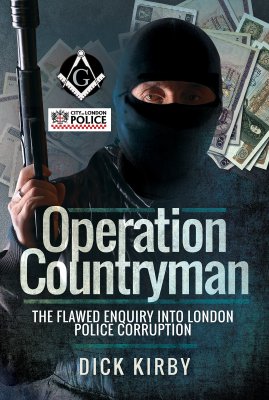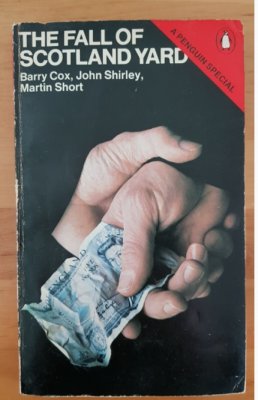- Joined
- Oct 29, 2002
- Messages
- 36,431
- Location
- East of Suez
I've just bumped into this topic and find it fascinating. Similar topics have cropped up on the verges of my (limited) reading around the Jack the Ripper / Yorkshire Ripper cases, but I didn't have any of the larger picture.
The short version is detailed here:
Operation Countryman was an investigation into police corruption in London in the late 1970s. The operation was conducted between 1978–1982 at a total cost of £3 million and led to eight police officers being prosecuted although none were convicted. The initial allegations of corruption were made by a "supergrass" — an informer occupying an important position in the criminal underworld — who claimed that some officers, including members of the elite Flying Squad (nicknamed "The Sweeney", a shortened version of the Cockney rhyming slang, Sweeney Todd) which dealt with commercial armed robberies, were receiving bribes from criminals in return for warnings of imminent police raids or arrests, the fabrication of evidence against innocent men, and to have charges against guilty criminals dropped.
The investigation initially targeted officers within the City of London Police but spread to include the Metropolitan Police based at Scotland Yard. Codenamed Operation Countryman because of its use of officers from so-called 'rural' police forces of Hampshire and Dorset, the investigating team came to be disparagingly known by London officers as "The Sweedy." The investigation was ordered by the then Home Secretary Merlyn Rees, and began by examining police activity around three major crimes:
In August 1978 officers began investigations into corruption within the London police services. The unit was initially accommodated at Camberwell police station in south London. But following attempts to interfere with the team's documents, records and evidence, it moved to Godalming Police Station in Surrey, outside the Metropolitan Police District.
Operation Countryman faced massive obstruction from both senior management and the lower ranks of the police. Much of the investigation's evidence was obtained by police officers going undercover as police officers.
Asst. Chief Constable Leonard Burt told his investigation team not to pass any evidence it obtained against Metropolitan Police officers to the Met Commissioner, David McNee. Shortly before his retirement in February 1980, the Chief Constable of Dorset Constabulary, Arthur Hambleton, the superior of Burt, made allegations that Countryman had been willfully obstructed by Commissioner McNee and Director of Public Prosecutions Sir Thomas Hetherington. In May 1980 Leonard Burt returned to Dorset Constabulary and responsibility for Countryman passed to Sir Peter Matthews, Chief Constable of Surrey Constabulary. He ordered that all evidence already compiled during the investigation be passed to the Metropolitan Police to be dealt with by their own internal investigation unit.
After six years, and at a cost of over £4 million, Operation Countryman presented its findings to the Home Office and the Commissioner. Parts of the report were leaked to the public. Despite Countryman's recommendation that some officers should face criminal charges, no officer was ever charged with a criminal offence as a result of the investigation. Dale Campbell-Savours said that "over 250 police officers were forced to resign and many faced criminal charges after investigations revealed that police membership of particular [Masonic] lodges formed the nucleus of a criminal conspiracy."
Questions asked in the British Parliament have, on several occasions, called on the Home Secretary to release the findings of Operation Countryman, but such requests have been refused as these are protected by public interest immunity.
https://en.wikipedia.org/wiki/Operation_Countryman
_____________________________________________________________________________________
Here's a retro-cool 'World In Action' documentary (whose broadcast the MET allegedly tried to prevent):
Cleaning Up The Yard
And here's the Hansard report of debate concerning a proposed Amendment to the Police Act (1964) that attempted to ban Freemasons from serving in the police force (in 1988). It was a ten-minute-bill debate and--like most attempts at legislation via that means without government support/time--it failed.
http://hansard.millbanksystems.com/...ct-1964-amendment#S6CV0136P0_19880628_HOC_186
Includes this gem of an exchange:
Mr. Bob Cryer (Bradford, South)
On a point of order. Mr. Speaker. In the interests of the happy procedures of the House, I want to raise this matter before we embark upon the ten-minute Bill. I understand that the Bill requires police constables to give information about their membership of freemasonry. Freemasonry involves a direct pecuniary interest and advantage to any member of the freemasons. I hasten to say that I am not a freemason.
If hon. Members have a direct pecuniary interest in a matter, they are not allowed to vote on it. This does not involve general legislation. Because the constables covered by the Bill could be members of the lodges of which hon. Members are members, there will be a direct link. I hope, Mr. Speaker, that you will listen to the arguments advanced by my hon. Friend the Member for Workington (Mr. Campbell-Savours) and conclude that hon. Members who are freemasons, but who are not, unfortunately, required to make a declaration to that effect, should stay out of the Division Lobby when the vote is taken, thereby avoiding any suspicion that they are voting for, or against, the Bill for their financial benefit.
§Mr. Speaker
I think that we should wait to hear what is said in introducing the Bill. Like the hon. Member, I am not a mason. I understand that it is very difficult to find out who is a mason.
§Mr. Dennis Skinner (Bolsover)
Further to that point of order, Mr. Speaker. If you will not take the advice offered by my hon. Friend the Member for Bradford, South (M r. Cryer), perhaps the hon. Members concerned will roll up their trouser legs when they go into the Lobbies.
§Mr. Speaker
I shall watch most carefully.
The short version is detailed here:
Operation Countryman was an investigation into police corruption in London in the late 1970s. The operation was conducted between 1978–1982 at a total cost of £3 million and led to eight police officers being prosecuted although none were convicted. The initial allegations of corruption were made by a "supergrass" — an informer occupying an important position in the criminal underworld — who claimed that some officers, including members of the elite Flying Squad (nicknamed "The Sweeney", a shortened version of the Cockney rhyming slang, Sweeney Todd) which dealt with commercial armed robberies, were receiving bribes from criminals in return for warnings of imminent police raids or arrests, the fabrication of evidence against innocent men, and to have charges against guilty criminals dropped.
The investigation initially targeted officers within the City of London Police but spread to include the Metropolitan Police based at Scotland Yard. Codenamed Operation Countryman because of its use of officers from so-called 'rural' police forces of Hampshire and Dorset, the investigating team came to be disparagingly known by London officers as "The Sweedy." The investigation was ordered by the then Home Secretary Merlyn Rees, and began by examining police activity around three major crimes:
- a £175,000 payroll robbery at the offices of the Daily Express newspaper in 1976
- a £225,000 robbery outside the headquarters of Williams & Glyn's Bank, London, in 1977
- a £200,000 payroll robbery at the offices of the Daily Mirror newspaper in 1978. During this robbery, Antonio Castro, a 38-year-old guard working for Security Express, was shot and killed.
In August 1978 officers began investigations into corruption within the London police services. The unit was initially accommodated at Camberwell police station in south London. But following attempts to interfere with the team's documents, records and evidence, it moved to Godalming Police Station in Surrey, outside the Metropolitan Police District.
Operation Countryman faced massive obstruction from both senior management and the lower ranks of the police. Much of the investigation's evidence was obtained by police officers going undercover as police officers.
Asst. Chief Constable Leonard Burt told his investigation team not to pass any evidence it obtained against Metropolitan Police officers to the Met Commissioner, David McNee. Shortly before his retirement in February 1980, the Chief Constable of Dorset Constabulary, Arthur Hambleton, the superior of Burt, made allegations that Countryman had been willfully obstructed by Commissioner McNee and Director of Public Prosecutions Sir Thomas Hetherington. In May 1980 Leonard Burt returned to Dorset Constabulary and responsibility for Countryman passed to Sir Peter Matthews, Chief Constable of Surrey Constabulary. He ordered that all evidence already compiled during the investigation be passed to the Metropolitan Police to be dealt with by their own internal investigation unit.
After six years, and at a cost of over £4 million, Operation Countryman presented its findings to the Home Office and the Commissioner. Parts of the report were leaked to the public. Despite Countryman's recommendation that some officers should face criminal charges, no officer was ever charged with a criminal offence as a result of the investigation. Dale Campbell-Savours said that "over 250 police officers were forced to resign and many faced criminal charges after investigations revealed that police membership of particular [Masonic] lodges formed the nucleus of a criminal conspiracy."
Questions asked in the British Parliament have, on several occasions, called on the Home Secretary to release the findings of Operation Countryman, but such requests have been refused as these are protected by public interest immunity.
https://en.wikipedia.org/wiki/Operation_Countryman
_____________________________________________________________________________________
Here's a retro-cool 'World In Action' documentary (whose broadcast the MET allegedly tried to prevent):
Cleaning Up The Yard
And here's the Hansard report of debate concerning a proposed Amendment to the Police Act (1964) that attempted to ban Freemasons from serving in the police force (in 1988). It was a ten-minute-bill debate and--like most attempts at legislation via that means without government support/time--it failed.
http://hansard.millbanksystems.com/...ct-1964-amendment#S6CV0136P0_19880628_HOC_186
Includes this gem of an exchange:
Mr. Bob Cryer (Bradford, South)
On a point of order. Mr. Speaker. In the interests of the happy procedures of the House, I want to raise this matter before we embark upon the ten-minute Bill. I understand that the Bill requires police constables to give information about their membership of freemasonry. Freemasonry involves a direct pecuniary interest and advantage to any member of the freemasons. I hasten to say that I am not a freemason.
If hon. Members have a direct pecuniary interest in a matter, they are not allowed to vote on it. This does not involve general legislation. Because the constables covered by the Bill could be members of the lodges of which hon. Members are members, there will be a direct link. I hope, Mr. Speaker, that you will listen to the arguments advanced by my hon. Friend the Member for Workington (Mr. Campbell-Savours) and conclude that hon. Members who are freemasons, but who are not, unfortunately, required to make a declaration to that effect, should stay out of the Division Lobby when the vote is taken, thereby avoiding any suspicion that they are voting for, or against, the Bill for their financial benefit.
§Mr. Speaker
I think that we should wait to hear what is said in introducing the Bill. Like the hon. Member, I am not a mason. I understand that it is very difficult to find out who is a mason.
§Mr. Dennis Skinner (Bolsover)
Further to that point of order, Mr. Speaker. If you will not take the advice offered by my hon. Friend the Member for Bradford, South (M r. Cryer), perhaps the hon. Members concerned will roll up their trouser legs when they go into the Lobbies.
§Mr. Speaker
I shall watch most carefully.



